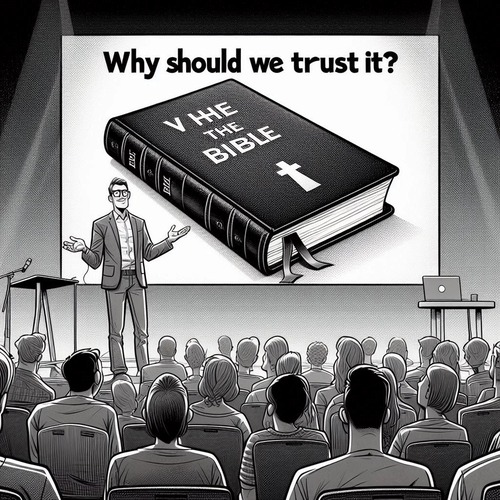With Sling Or Sword: How Did David Slay Goliath?
Sure, everyone’s heard of David’s victory over Goliath. It’s a story that retains its enduring charm in people’s minds. But probe deeper in the text, and we shall begin to see the bible account presents conflicting information—or what looks like it: The ESV states David “struck down the Philistine and killed him” with the sling (v. 50), then later “killed him” and cut off his head with the sword (1 Samuel 17:51). The NLT, however, suggests it is the sword that delivered the fatal blow: “David triumphed over the Philistine with only a sling and a stone,” but then “he killed the Philistine and cut off his head” with the sword. The translation variance has added to the confusion among Bible readers.
So how did David slay the giant—with sling or sword?
THE TRANSLATION CHALLENGE: WHAT DOES THE HEBREW SAY?
The key to resolving this apparent contradiction lies in understanding the Hebrew verbs in 1 Samuel 17. In verse 50, the Hebrew uses two different verbs: nākāh (struck down/defeated) and mûth (caused to die/killed). The text literally reads: “So David prevailed over the Philistine with the sling and with the stone, and struck down (nākāh) the Philistine and killed him (mûth), but there was no sword in David’s hand.”
Verse 51 then uses mûth again in a past perfect construction: “After he had killed him (mûth), he cut off his head with the sword.” The Hebrew grammar indicates the killing had already occurred before the beheading—the sword was used post-mortem.
The confusion arises because some translations render both instances of mûth as simple past tense “killed,” creating the impression of two separate killings. However, the Hebrew temporal markers and verb forms clearly indicate sequence: the sling killed, and the sword beheaded the already-dead giant.
WHAT SCRIPTURE ACTUALLY TEACHES: SLING KILLED, SWORD FINISHED
When we apply careful exegetical analysis to the Hebrew text, 1 Samuel 17:50-51 reveals no contradiction whatsoever. The stone from David’s sling delivered the fatal blow that killed Goliath instantly—this is explicitly stated with the emphatic phrase “but there was no sword in David’s hand” to remove any ambiguity about the killing instrument.
The sword served an entirely different purpose: providing definitive proof of victory through beheading. In ancient Near Eastern warfare, decapitation was the standard way to confirm an enemy’s death and demonstrate complete conquest to watching armies. David used Goliath’s own sword to accomplish this symbolic and practical necessity.
This interpretation aligns perfectly with the Reformed principle of tota scriptura—letting all of Scripture inform our understanding. The broader biblical narrative consistently emphasises David’s victory came through faith in God’s power working through simple means, not through superior weaponry.
BOTH METHODS SERVED DIVINE PURPOSE
From a Reformed perspective, both sling and sword played essential roles in God’s sovereign plan, each serving distinct purposes in this miraculous victory.
The sling delivered the fatal blow that killed Goliath instantly. The simple shepherd’s tool, guided by divine providence, accomplished what no weapon of war could achieve through human strength alone. David had spent years perfecting his skill with the sling while protecting his father’s sheep—preparation that God sovereignly used for His greater purposes.
The sword, however, served multiple crucial functions. First, it ensured complete victory by providing visible, undeniable proof of Goliath’s defeat to both armies. In ancient warfare, beheading an enemy was the ultimate confirmation of conquest. Second, it fulfilled the customs of ancient Near Eastern combat, where taking the enemy’s weapon demonstrated total triumph. Third, and perhaps most significantly, it created a powerful symbolic reversal—the very weapon Goliath had brandished in defiance of God’s people became the instrument of his final humiliation.
This dual-method victory perfectly illustrates the Reformed principle that God works through ordinary means. David’s skill was real and necessary, yet it was God’s power that made the difference. As the Westminster Confession affirms, God’s providence extends to all events, working through secondary causes while remaining the primary cause of all outcomes.
THEOLOGICAL SIGNIFICANCE: WHY THE METHOD MATTERS
David’s famous declaration in 1 Samuel 17:47 reveals the heart of this entire episode: “All those gathered here will know that it is not by sword or spear that the Lord saves; for the battle is the Lord’s, and he will give all of you into our hands.” This wasn’t merely a confident battle cry—it was a theological statement about God’s sovereign orchestration of events to maximise His own glory.
God carefully arranged every detail of this confrontation to ensure He alone would receive the credit. Consider the divine orchestration: a shepherd boy with no military training faces a professional warrior; a simple sling confronts sophisticated armour; a stone defeats what bronze and iron could not. Even the dual method of victory—sling and sword—serves God’s glory by demonstrating both His power over human strength and His authority over the enemy’s own weapons.
The Reformed doctrine of God’s sovereignty shines brilliantly here. God didn’t merely use David’s existing skills—He providentially prepared those skills through years of faithfulness in shepherding, then orchestrated circumstances to showcase His power through apparent weakness. The method matters because it eliminates any possibility of human boasting while magnifying divine glory.
From a typological perspective, this careful divine orchestration prefigures Christ’s victory at Calvary. Just as God arranged David’s triumph to confound human wisdom and glorify Himself, so Christ’s apparent defeat on the cross was God’s masterful orchestration to achieve ultimate victory over sin and death—all for His maximum glory.
THE HEART OF THE MATTER: PRACTICAL APPLICATIONS FOR TODAY
Understanding God’s sovereign orchestration of David’s victory transforms how we view our own circumstances. Just as God prepared David through years of faithful shepherding and then arranged the perfect moment to display His glory, He is orchestrating events in our lives for the same ultimate purpose—His maximum glory.
This means our seemingly mundane experiences aren’t random or wasted. God may be preparing us through present faithfulness for future moments where His power will shine through our weakness. Every challenge we face is an opportunity for God to demonstrate “the battle is the Lord’s.”
The dual method of David’s victory also teaches us about God’s comprehensive sovereignty. He orchestrates not just the main event but every detail—the preparation, the confrontation, and the aftermath. We can trust God is working all things together, even when we can’t see the complete picture, because His goal is always His maximum glory through our ultimate good.
Ultimately, the question of method points us to the message: victory comes “not by spear or sword, but by the Lord of hosts” (1 Samuel 17:45). The stone felled the giant; the sword finished the work—and both served to demonstrate that when God fights for His people, victory is certain, no matter how impossible the odds may appear.
HOW DID DAVID SLAY GOLIATH? RELATED FAQs
Why didn’t David use Saul’s armour if God was going to give him victory anyway? Reformed scholars like Matthew Henry emphasise David’s rejection of Saul’s armour demonstrates the principle that God’s methods rarely align with human wisdom. David understood relying on unfamiliar military equipment would obscure God’s glory and suggest human preparation was the key to victory. Calvin notes David’s refusal showed mature spiritual discernment—he chose to fight in a way that would clearly demonstrate divine power rather than human strategy.
- Was David’s sling really that powerful, or was this purely miraculous? Reformed commentators generally take a balanced view, recognising both natural and supernatural elements. The sling was indeed a formidable weapon in skilled hands—ancient slingers could achieve remarkable accuracy and force, capable of fracturing skulls. However, scholars like John Gill and Albert Barnes emphasise the precision needed to strike the one unarmoured spot—Goliath’s forehead—combined with the perfect timing. And David’s courage required divine providence working through natural means.
- How do we view David’s confidence before the battle? Reformed scholars distinguish David’s confidence from presumption by noting it was grounded in God’s past faithfulness and clear calling. Spurgeon observed David’s confidence stemmed from his covenantal understanding—he knew Israel’s God would not allow His name to be blasphemed by an uncircumcised Philistine. This wasn’t self-confidence but covenant confidence, rooted in God’s character and promises rather than David’s abilities.
Why did the Philistine army flee when they figured Goliath might lose? Reformed commentators note this reveals God’s sovereign control over human hearts and minds. Matthew Poole suggests the Philistines’ flight demonstrated divine judgement—God removed their courage as part of His plan to deliver Israel. The text indicates they had wagered everything on Goliath’s invincibility, so his defeat created panic that God used to rout the entire army, multiplying the victory beyond the single combat.
- What significance must we attach to David taking Goliath’s weapons? Calvin and other Reformed expositors view David’s appropriation of Goliath’s sword and armour (later given to the tabernacle) as a “firstfruits” offering to God. This act symbolised dedicating the spoils of victory to divine service rather than personal gain. Later, when David fled from Saul, he retrieved this same sword from the priests (1 Samuel 21:9), suggesting God’s providence in preserving instruments of past victory for future needs.
- How are we to view the apparent size discrepancy of “six cubits and a span”? Most Reformed commentators accept Goliath’s height as approximately 9-10 feet, seeing no need to minimise the miracle through textual criticism. Westminster divine Matthew Pool notes ancient records document similarly sized individuals, making Goliath unusual but not impossible. The emphasis in Reformed interpretation falls not on the exact measurements but on the stark contrast between human impossibility and divine power—the greater the giant, the greater God’s glory in victory.
What does the Reformed tradition say about the spiritual warfare implications of this account? Reformed scholars consistently interpret this narrative as a type of Christ’s victory over Satan, with David prefiguring the greater spiritual battle. John Owen and other Puritans emphasised that just as David defeated Israel’s physical enemy through God’s power, believers engage spiritual enemies through Christ’s accomplished work. The pattern remains consistent—apparent weakness (the cross) defeats ultimate evil through divine power, and victory belongs entirely to God rather than human effort or strategy.
HOW DID DAVID SLAY GOLIATH? OUR RELATED POSTS
Editor’s Pick

Sacred Fury: What Christ’s Temple Cleansing Truly Means
Mark 11 records the crack of a handmade whip that echoed through the temple corridors. Tables crashed to the ground, [...]

Did Jesus Cleanse the Temple Twice?
OR DID JOHN DISAGREE WITH THE SYNOPTICS ON TIMING? One of sceptics’ favourite "gotcha" questions targets what they see as [...]

Self-Authentication: Why Scripture Doesn’t Need External Validation
"How can the Bible prove itself? Isn't that circular reasoning?" This objection echoes through university classrooms, coffee shop discussions, and [...]

The Racial Diversity Question: Does the Bible Have Answers?
Walk into any bustling metropolis today and you'll likely witness humanity's breathtaking diversity—the deep ebony skin of a Sudanese family, [...]

Do Christians Need Holy Shrines? Why the Reformed Answer Is No
Walk into a medieval cathedral and you'll encounter ornate shrines, gilded reliquaries, and designated "holy places" where pilgrims gather to [...]

If God Is Sovereign, Why Bother Praying?
DOESN’T DIVINE SOVEREIGNTY OBVIATE PRAYER? **Editor’s Note: This post is part of our series, ‘Satan’s Lies: Common Deceptions in the [...]

I Want To Believe, But Can’t: What Do I Do?
"I want to believe in God. I really do. But I just can't seem to make it happen. I've tried [...]

BC 1446 or 1250: When Did the Exodus Really Happen?
WHY REFORMED SCHOLARS SUPPORT THE EARLY DATE Many a critic makes the claim: “Archaeology has disproven the biblical account [...]

Does God Know the Future? All of It, Perfectly?
Think about this: our prayers tell on us. Every time we ask God for something, we’re confessing—often without realising it—what [...]

Can Christian Couples Choose Permanent Birth Control?
Consider Sarah, whose fourth pregnancy nearly killed her due to severe pre-eclampsia, leaving her hospitalised for months. Or David and [...]





